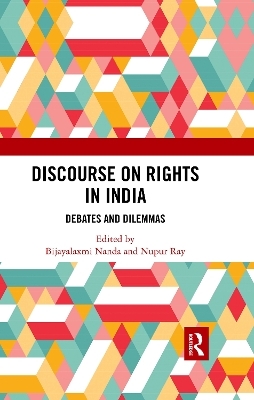
Discourse on Rights in India
Routledge India (Verlag)
978-0-367-47943-5 (ISBN)
This book is a compelling examination of the theoretical discourse on rights and its relationship with ideas, institutions and practices in the Indian context. By engaging with the crucial categories of class, caste, gender, region and religion, it draws attention to the contradictions and contestations in the arena of rights and entitlements. The chapters by eminent experts provide deep and nuanced insights on the intersecting issues and concerns of individual and group identities as well as their connection with the state along with its multifarious institutions and practices. The volume not only engages with the dilemmas emerging out of the rights discourse but also sets out to recognize the significance of a shared commitment to a rights-based framework towards the promotion of justice and democracy in society.
The book will be useful to academics, social scientists, researchers and policymakers. It will be of special interest to teachers and students in the fields of politics, development studies, philosophy, ethics, sociology, gender/women’s studies and social movements.
Bijayalaxmi Nanda is Associate Professor, Department of Political Science, Miranda House, University of Delhi, India. Her areas of specialization include political theory, feminist politics and human rights. She has been conferred the Teacher’s Excellence Award (2017) by the University of Delhi. She is actively involved with campaigns for the rights of girl children and women in India for the past two decades. Her publications include Sex-Selective Abortion and the State: Politics, Laws and Institutions in India (2018), Human Rights, Gender and Environment (co-authored, 2007) and Understanding Social Inequality: Concerns of Human Rights, Gender and Environment (co-edited, 2010). She has also contributed chapters to edited volumes and has written extensively on issues of gender discrimination, girl-child rights, health and education policies, human development and human rights. Nupur Ray is Assistant Professor, Department of Political Science, Kamala Nehru College, University of Delhi, India. Her areas of interest include political philosophy, feminist politics and political theory. She is associated with campaigns to counter violence against women in India. She has written extensively on the rights discourse and has published ‘Exploring ‘empowerment’ and ‘agency’ in Ronald Dworkin’s Theory of Rights: A Study of Women’s Abortion Rights in India’ in the Indian Journal of Gender Studies (2014). She has contributed chapters to edited volumes and presented papers at various national and international conferences.
Contributors. Preface. Acknowledgements. List of Abbreviations. Introduction: Discourse on Rights in India: Debates and Dilemmas Part I: Theorizing Rights: Diversity and Difference Chapter 1: Dimensions of Power and Social Transformation Chapter 2: Constitutionalizing Rights, Negotiating Difference: The Indian Experiment Chapter 3: Gender, Rights and the Justice Gap: Going Beyond the Politics of Difference Chapter 4: Law, Rights and Politics: Dilemmas and Responses Chapter 5: Human Rights, Climate Change and Climate Justice Chapter 6: What can Human Rights add to the Fight against Corruption? Some Lessons from India Part II: Gender, Religion, Family, Work, Caste and Community: Issues and Contestations Chapter 7: Sex-Selective Abortion and Reproductive Rights: A Syncretic Feminist Approach Chapter 8: Bodily Rights and Agency: Looking at the Rights Discourse of Women in Prostitution Chapter 9: Women in Politics and the Subject of Representations Chapter 10: The Triple Talaq Controversy: Gender Concerns and Minority Safeguards Chapter 11: Women and Disability: Issues of Care Part III: The ‘Myth’ of Conflicting Rights: A Critique of the Indian State Chapter 12: India’s Education Policy and Failures of Empathy Chapter 13: The ‘Right’ Music: Caste and ‘Classical’ Music in South India Chapter 14: The Trajectories of Work, Sexuality and Citizenship: The Rights of the Transgender in India Chapter 15: People and the Terrains: PESA Reconsidered Chapter 16: Dilemmas in Kashmir: A Human Rights Perspective. Beyond Conclusions: Discourse on Rights in India: A Case for Reflective Autonomy. Index
| Erscheinungsdatum | 17.01.2020 |
|---|---|
| Zusatzinfo | 1 Tables, black and white; 2 Line drawings, black and white; 2 Illustrations, black and white |
| Verlagsort | London |
| Sprache | englisch |
| Maße | 138 x 216 mm |
| Gewicht | 517 g |
| Themenwelt | Sozialwissenschaften ► Politik / Verwaltung ► Politische Theorie |
| Sozialwissenschaften ► Soziologie ► Makrosoziologie | |
| ISBN-10 | 0-367-47943-5 / 0367479435 |
| ISBN-13 | 978-0-367-47943-5 / 9780367479435 |
| Zustand | Neuware |
| Informationen gemäß Produktsicherheitsverordnung (GPSR) | |
| Haben Sie eine Frage zum Produkt? |
aus dem Bereich


